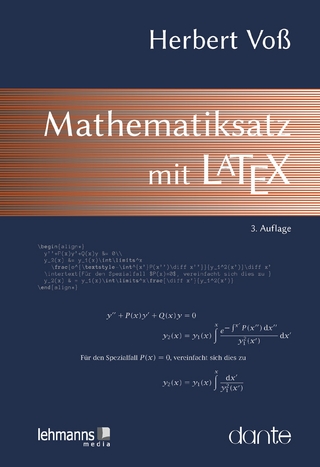
Deadlock Resolution in Computer-Integrated Systems
Crc Press Inc (Verlag)
978-0-8247-5368-9 (ISBN)
- Titel z.Zt. nicht lieferbar
- Versandkostenfrei innerhalb Deutschlands
- Auch auf Rechnung
- Verfügbarkeit in der Filiale vor Ort prüfen
- Artikel merken
Complex computer-integrated systems offer enormous benefits across a wide array of applications, including automated production, transportation, concurrent software, and computer operating systems, computer networks, distributed database systems, and many other automated systems. Yet, as these systems become more complex, automated, distributed, and computing-intensive, the opportunity for deadlock issues rises exponentially. Deadlock modeling, detection, avoidance, and recovery are critical to improving system performance.
Deadlock Resolution in Computer-Integrated Systems is the first text to summarize and comprehensively treat this issue in a systematic manner. Consisting of contributions from prominent researchers in the field, this book addresses deadlock-free models and scheduling, detection and recovery methods, the formulation of dynamic control policies, and comparison and industrial benchmark studies that evaluate various approaches. The editors lay the foundation for exploring deadlock issues with a typical example of an automated manufacturing process, illustrating three primary modeling methods (digraphs, Petri nets, and automata) and comparing their respective advantages and disadvantages.
Providing all of the important models and resolution approaches, this book is the complete guide for electrical and control engineers and manufacturing, intelligent, and network systems designers to prevent and manage deadlock issues in their systems.
MengChu Zhou, Maria Pia Fanti
List of Contributors. Preface. Introduction to Deadlock Research in Computer-Integrated Systems. Deadlock Avoidance in Automated Manufacturing Systems Using Finite Automata and State Space Search. Synthesis of Deadlock-Free Supervisory Controllers Using Automata. Deadlock Avoidance and Dynamic Routing Flexibility in Automated Manufacturing Systems. Digraph-Based Techniques for Deadlock Resolution in Automated Manufacturing Systems. Deadlock-Free Supervisory Control for Assembly and Disassembly Systems. Deadlock Avoidance Algorithms and Implementation: A Matrix Based Approach. Deadlock Detection and Prevention of Automated Manufacturing Systems Using Petri Nets and Siphons. Siphon-Based Characterization of Liveness and Liveness-Enforcing Supervision for Sequential Resource Allocation Systems. Elementary Siphons of Petri Nets for Efficient Deadlock Control. Resource-Oriented Petri Nets in Deadlock Prevention and Avoidance. The Effect of Modeling and Control Techniques on the Management of Dead-locks in FMS. Deadlock Characterization and Resolution in Interconnection Networks. Deadlock Models for a Multi-Service Medium Access Protocol Employing a Slotted Aloha or Q-ary Tree Based Signaling Channel. Deadlock-Free TCP Over High-Speed Internet. Deadlock Resolution in Large-Scale Internet Computing. Models Used in Static Analysis for Deadlocks of Ada Tasking Programs. Deadlock Handling in Database Systems. Index.
| Erscheint lt. Verlag | 27.12.2004 |
|---|---|
| Zusatzinfo | 38 Tables, black and white; 263 Halftones, black and white; 263 Illustrations, black and white |
| Verlagsort | Bosa Roca |
| Sprache | englisch |
| Maße | 156 x 234 mm |
| Gewicht | 1125 g |
| Themenwelt | Mathematik / Informatik ► Informatik ► Betriebssysteme / Server |
| Mathematik / Informatik ► Informatik ► Software Entwicklung | |
| Mathematik / Informatik ► Informatik ► Theorie / Studium | |
| Technik ► Maschinenbau | |
| ISBN-10 | 0-8247-5368-2 / 0824753682 |
| ISBN-13 | 978-0-8247-5368-9 / 9780824753689 |
| Zustand | Neuware |
| Haben Sie eine Frage zum Produkt? |
aus dem Bereich


